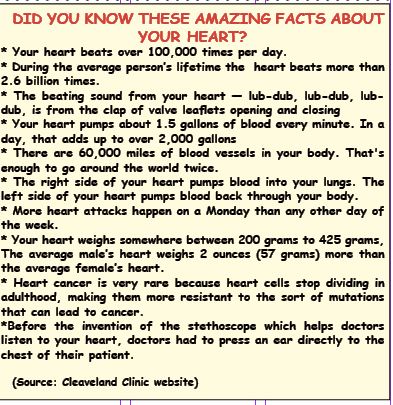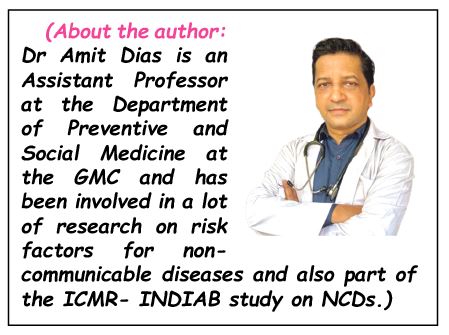A World Heart Day Special
Heart health matters and on World Heart Day on September 29 we get to the heart of the matter and speak with DR AMIT DIAS from the Department of Preventive & Social Medicine at the Goa Medical College & Hospital. “Do not neglect your heart – it also needs some love. Eighteen million lives are lost every year due to heart disease,” he says. Find answers to frequently asked questions in this informative interview….
Goan Observer: Greetings on World Heart Day! Can you throw some light on the recent trends in heart disease?
Dr Amit Dias: Unfortunately, the incidence of cardiovascular diseases is on the rise, including coronary artery disease (CAD) and heart attacks. The WHO estimates that around 18 million lives are lost every year due to heart disease.
What is worse is the shift toward the younger population, which has become very prominent in recent years. We have still not recovered from the shocking news of deaths of some of the young people in our state and young celebrities in the recent past who died of sudden cardiac arrest.
Q: That is true, what are the possible reasons for younger people getting heart attacks?
A: Several factors could contribute to the increased occurrence of heart attacks in younger people in India. There is an increase in the adoption of unhealthy lifestyle choices, such as poor diet, increase in salt consumption, the use of trans fats, lack of physical activity, smoking and excessive alcohol consumption, which has contributed to the rising incidence of heart disease among younger individuals.
Stress is also on the rise. Modern lifestyles and work schedules, often involve high levels of stress, and the need to meet deadlines, which can contribute to CVD risk factors like high blood pressure and unhealthy coping mechanisms such as overeating or smoking.
Some individuals may have a genetic predisposition to heart disease, making them more susceptible at a younger age.
The increasing prevalence of diabetes and obesity in India is a significant risk factor for heart disease. These conditions are affecting younger age groups more frequently. In our recent ICMR-INDIAB study, we found that Goa has the highest prevalence of diabetes in India with 26.4% above the age of 20 years.
High levels of air pollution in many Indian cities are also linked to an increased risk of heart disease.
I had published a paper on the young myocardial infarctions in the state of Goa and the risk factors, way back in 2008 on the risk factors in younger adults who had a heart attack, highlighting the risk factors in young Goan adults. If lifestyle in Goa does not change the trend will not change either.
Coincidentally the trend has been rising since the COVID-19 pandemic. We need to explore robustly the impact of the disease and the vaccine in predisposing people to heart disease and heart blocks. We cannot throw this hypothesis under the carpet. There are reports of myocarditis, pulmonary embolism, vaccine-induced thrombotic thrombocytopenia, tachycardia and other ailments following the vaccine campaign.

Q: How do we address this growing problem?
A: It’s important to note that addressing these trends requires a multifaceted approach involving public health initiatives, lifestyle modifications, and improving access to healthcare. An innovative project like the STEMI (ST -Elevation Myocardial Infarction) project started in the state of Goa in association with Tricog Health Services, is a good example of how we can respond to the changing trends. In a heart attack — time is crucial and one needs to get to a well-equipped health center within the golden hour to get the maximum benefit.
However, prevention is always better than cure. And attempts must be made to improve primary care.
Q: What advice would you give our readers for the prevention of heart disease?
A: There are many steps that individuals can take to lower their risk. First and foremost is adopting a heart-healthy lifestyle, which includes:
- Diet: Emphasize fruits, vegetables, whole grains, lean proteins and healthy fats. Limit processed foods and excess salt.
- Exercise: Aim for at least 150 minutes of moderate-intensity aerobic activity or 75 minutes of vigorous-intensity aerobic activity each week.
- Smoking Cessation: Quitting smoking is one of the most impactful steps to reduce heart disease risk.
- Blood Pressure Control: Regularly monitor blood pressure and take prescribed medications if necessary.
- Blood Sugar Management: For individuals with diabetes, keeping blood sugar levels within a healthy range is crucial.
- Stress Management: Engage in stress-reduction techniques like meditation, yoga or mindfulness.
- Weight Management: Achieve and maintain a healthy weight through diet and exercise. Remember the BMI Ranges – Underweight = <18.5, Normal weight = 18.5 – 24.9, Overweight = 25 – 29.9, Obesity = 30 or greater
Q: What can be done to promote a culture of prevention?
A: People have to be motivated to bring about behavioural changes. We exercise during childhood in school but in adulthood our life is almost devoid of any exercise. We do see a changing trend towards fitness which is a good sign. There are exciting developments on the horizon in the field of preventive cardiology.
One of the most promising areas is the use of artificial intelligence and machine learning to predict and prevent heart disease. These technologies can analyse vast datasets to identify at-risk individuals and provide personalized recommendations.
We’re also seeing advancements in wearable technology, smart watches and remote monitoring, which can help individuals and healthcare providers understand heart health in real time. This allows for early intervention and personalized treatment plans.
Q: What is your advice to our readers?
A: The heart has been a universal symbol of love, one needs to remember that our heart needs our love as well. It’s not too late to start, everyone should do their part and take care of their heart. The World Heart Federation has a very interesting campaign to improve heart health. Look up the website and join the campaign. The theme this year is — USE HEART TO KNOW HEART. On this World Heart Day let us all take action and empower ourselves to address CVD risk factors and improve disease outcomes.

